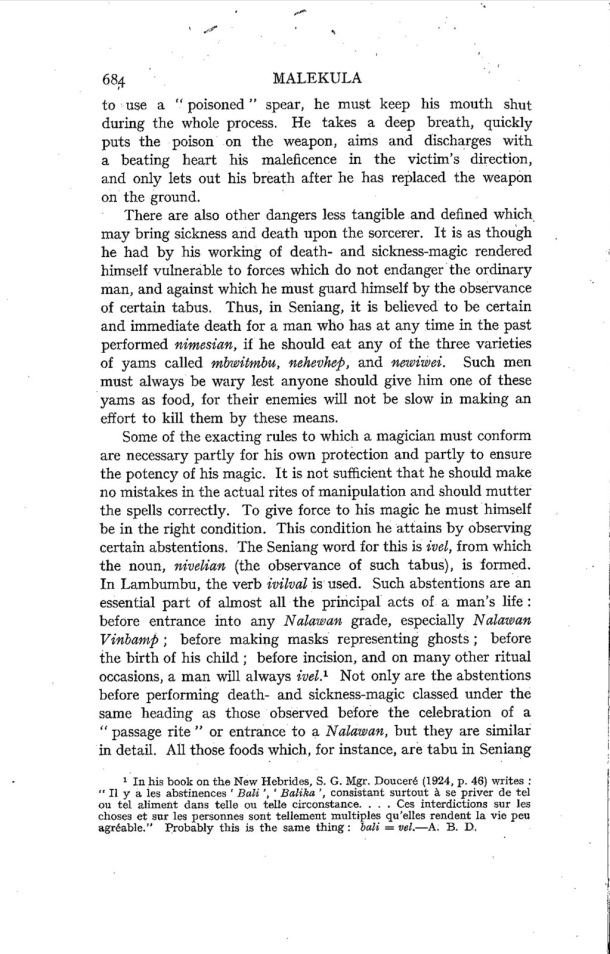|
|  [Note: this transcription was produced by an automatic OCR engine]
/»
_,/ . ‘
684 ‘ MALEKULA '
to use a “ poisoned â€ù spear, he must keep his mouth shut
during the whole process. He takes a deep breath, quickly
puts the poison on the weapon, aims and discharges with
a beating heart his maleï¬Åcence in the victin-l’s direction,
and only lets out his breath after he has replaced the weapon
on the ground.
There are also other dangers less tangible and deï¬Åned which
may bring sickness and death upon the sorcerer. It is as though
he had by his working of death- and sickness-magic rendered
himself vulnerable to forces which do not endanger the ordinary
man, and against which he must guard himself by the observance
of certain tabus. Thus, in Seniang, it is believed to be certain
and immediate death for a man who has at any time in the past
performed nimesian, if he should eat any of the three varieties
of yams called mbwit/rnbu, nehevhzp, and mwiwm‘. Such men
must always be wary lest anyone should give him one of these
yams as food, for their enemies will not be slow in making an
effort to kill them by these means.
Some of the exacting rules to which a magician must conform
are necessary partly for his own protection and partly to ensure
the potency of his magic. It is not sufficient that he should make
no mistakes in the actual rites of manipulation and should mutter
the spells correctly. To give force to his magic he must himself
be in the right condition. This condition he attains by observing
certain abstentions. The Seniang word for this is ivel, from which
the noun, niuelian (the observance of such tabus), is formed.
In Lambumbu, the verb ivilval is used. Such abstentions are an
essential part of almost all the principal acts of a man’s life:
before entrance into any Nalau/an grade, especially N alau/an
Vmbamp; before making masks representing ghosts; before
the birth of his child ; before incision, and on many other ritual
occasions, a man will always ivel} Not only are the abstentions
before performing death» and sickness-magic classed under the
same heading as those observed before the celebration of a
" passage rite " or entrance to a Nahzwan, but they are similar
in detail. All those foods which, for instance, are tabu in Seniang
1 In his book on the New Hebrides, S. G. Mgr. Doucexé (1924, p. 46) writes I
" Il y a les abstinences ' Bali ’, ‘ Bulika ’, consistent surtout 3 Se priver dc tel
on tel aliment dans telle on telle circonstance. . . . Ces interdictions sur lee
choses ct sur les personnes sout tellement multiples qu’elles rendent la vie pen
agtéable." Probably this is the same thing: bflli = wl.—A. B. D,
|